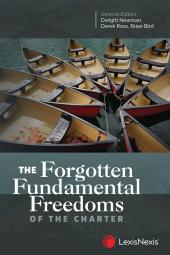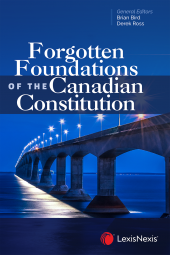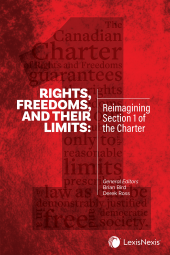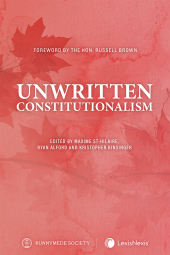The Forgotten Fundamental Freedoms of the Charter
One Year Subscription Only Terms
Subscribers receive the product(s) listed on the Order Form and any Updates made available during the annual subscription period. Shipping and handling fees are not included in the annual price.
Subscribers are advised of the number of Updates that were made to the particular publication the prior year. The number of Updates may vary due to developments in the law and other publishing issues, but subscribers may use this as a rough estimate of future shipments. Subscribers may call Customer Support at 800-833-9844 for additional information.
Subscribers may cancel this subscription by: calling Customer Support at 800-833-9844; emailing customer.support@lexisnexis.com; or returning the invoice marked 'CANCEL'.
If subscribers cancel within 30 days after the product is ordered or received and return the product at their expense, then they will receive a full credit of the price for the annual subscription.
If subscribers cancel between 31 and 60 days after the invoice date and return the product at their expense, then they will receive a 5/6th credit of the price for the annual subscription. No credit will be given for cancellations more than 60 days after the invoice date. To receive any credit, subscriber must return all product(s) shipped during the year at their expense within the applicable cancellation period listed above.
Product description
Assistant Editor: Sarah E. Mix-Ross
Among the fundamental freedoms guaranteed by section 2 of the Charter, only a few have been paid significant attention. The others—freedom of conscience, thought, belief, opinion, the press, other media of communication, peaceful assembly, and association—have been largely forgotten to date. What do these freedoms protect? Why are they “fundamental” to a liberal democracy, and how might they be realized? And what do we still need to learn about the meaning of freedom generally?
These questions and more are examined throughout this collection of essays, breaking new ground for human rights discourse in Canada and beyond and exploring the rich potential of the Charter’s “forgotten freedoms”. A recurring theme throughout is that these freedoms must not simply be “remembered”. If Canada is to be the free and democratic society contemplated by the Charter, these freedoms must also live and breathe within our constitutional practice.
The papers first discuss the jurisprudential background of the Charter and then the common themes and connections between different forgotten freedoms. The volume then analyzes in depth each of the fundamental freedoms. Also included is an appendix outlining the history of section 2 of the Charter and resulting sources, as well as comparative provisions in international human rights instruments, that may be used for further research.
Features of This Book
- In-depth analysis of the jurisprudence, along with philosophical underpinnings, of the fundamental freedoms
- Challenging insights inviting reflections on development of the interpretation of the fundamental freedoms
- Discussion of practical issues related to exercising of fundamental freedoms
- Diverse perspectives from leading authorities, including notable contributions from Jamie Cameron, Dwight Newman, Derek Ross and Mary Anne Waldron
The Collection of Papers
- The Honourable Justice Peter D. Lauwers – Foreword
- Dwight Newman, Derek Ross & Brian Bird – The Forgotten Fundamental Freedoms: An Introduction
- Jamie Cameron – Big M’s Forgotten Legacy of Freedom
- Dwight Newman – Recovering Forgotten Freedoms
- Derek B.M. Ross – Truth-Seeking and the Unity of the Charter’s Fundamental Freedoms
- Brian Bird – The Reasons for Freedom of Conscience
- Barry W. Bussey – Blazing the Path: Freedom of Conscience is the Prototypical Right
- Mary Anne Waldron – Putting Conscience Rights in a Box: Can We Take Off the Lid?
- Blair A. Major – Religious Proselytization in Canadian Law: The Residue in the Periphery
- Monica Fitzpatrick & Dwight Newman – Freedoms of Thought, Belief, and Opinion as Protected Inner Freedoms
- Benjamin J. Oliphant – Would Independent Protection for Freedom of the Press Make a Difference? The Case of Vice Media v. Canada (Attorney General)
- Sina Kazemi & Avnish Nanda – Section 2(b) of the Charter and the Regulation of Digital Expression
- Nnaemeka Ezeani – Understanding Freedom of Peaceful Assembly in the Canadian Charter of Rights and Freedoms
- Kristopher E.G. Kinsinger – Positive Freedoms and Peaceful Assemblies: Reenvisioning Section 2(c) of the Charter
- André Schutten – Recovering Community: Addressing Judicial Blindspots on Freedom of Association
- Melanie R. Bueckert – Evolution: On the Origins of Section 2
Recommended Reading For:
- Constitutional and Human Rights Lawyers – learn more about recent developments in the interpretation of Charter rights and freedoms, and gain insights on their potential for the future
- Police and Government Counsel – advise on limits on peaceful assembly
- Media Lawyers – advise on interpretations of freedom of expression and freedom of press
- Religious Organizations and Voluntary Associations – understand recent court approaches in interpreting Charter freedoms and other issues core to civic organizations and faith groups
- Academia – insight on the latest developments in the all-time tension in the understanding of freedoms
The Forgotten Fundamental Freedoms of the Charter is a collection of papers developed out of the Supreme Court Law Review, Second Series.
Table of contents
PART I: RECOVERING WHAT HAS BEEN FORGOTTEN
PART II: FREEDOM OF CONSCIENCE AND RELIGION
PART III: FREEDOM OF THOUGHT, BELIEF, OPINION AND EXPRESSION, INCLUDING FREEDOM OF THE PRESS AND OTHER MEDIA OF COMMUNICATION
PART IV: FREEDOM OF PEACEFUL ASSEMBLY
PART V: FREEDOM OF ASSOCIATION
 Lexis Nexis
Lexis Nexis 


